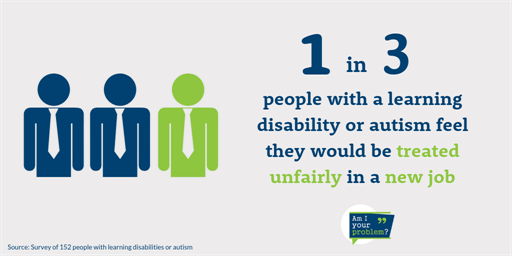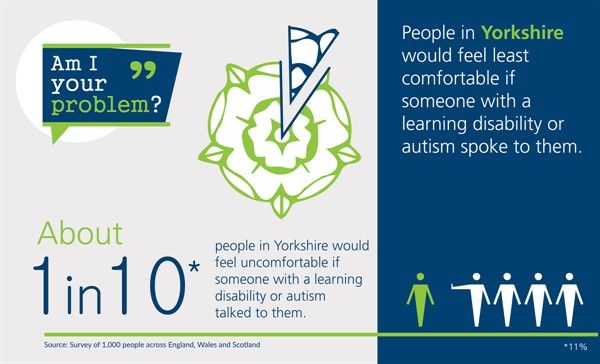Am I Your Problem?
We are calling on the general public to consider how their interaction and behaviour can harm people with learning disabilities or autism, dent their confidence and exclude them from society.
Our survey* of people with a learning disability or autism found:
- Over a third of people with learning disabilities or autism feel they would be treated unfairly in a new job by colleagues because of their disability
- Roughly one in four feel they have been victimised in shops and restaurants, and also on public transport
*Survey of 152 people with a learning disability or autism

Our public survey** found:
- Londoners are the least comfortable people in England, Wales and Scotland when it comes to sharing a restaurant, office, pub or even public transport with someone with a learning disability or autism
- People living in Yorkshire would feel the least comfortable of any region if someone with a learning disability or autism spoke to them
- Only half (56%) of those surveyed would be happy if their child was taught at school by someone with autism or a learning disability
**Survey of 1,000 people across England, Wales and Scotland

Tips on how to help someone with a learning disability or autism
Want to know how you can help someone with a learning disability or autism in the community? Here are some tips, produced by people we support, as part of the Am I Your Problem? campaign.
1. Don’t stare
Many people with a learning disability or autism get stared at all the time, and it can make them feel uncomfortable and unwelcome.
2. Treat people like adults
A lot of people get spoken to like they are children, even when they are well into their adult years.
3. Treat people like human beings
Talk to people with respect and kindness, not hostility or suspicion.
4. Be patient
Some people with a learning disability or autism might take longer to communicate what they want, and it can be stressful when someone is showing signs of losing their patience.
5. Provide opportunities
Many people with a learning disability or autism struggle to find work, so if you’re in a position to give career opportunities, do so. There are plenty of reasons why people with disabilities can make great employees. We also work with employers to help support people with disabilities into work.
6. Question your own behaviour
A lot of people have reported that even health professionals can be guilty of doing some of the things we’ve just described. Even if you work with people with learning disabilities or autism, you should still question if your behaviour is making someone feel uncomfortable.